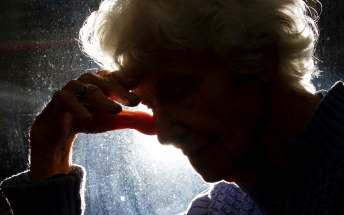Lengthy delays evaluating care-home abuse complaints raise concerns Auditor general launches probe into number of unresolved and not-yet investigated files — some dating back to 2018 — by understaffed branch of Manitoba Health
Read this article for free:
or
Already have an account? Log in here »
To continue reading, please subscribe:
Monthly Digital Subscription
$0 for the first 4 weeks*
- Enjoy unlimited reading on winnipegfreepress.com
- Read the E-Edition, our digital replica newspaper
- Access News Break, our award-winning app
- Play interactive puzzles
*No charge for 4 weeks then price increases to the regular rate of $19.00 plus GST every four weeks. Offer available to new and qualified returning subscribers only. Cancel any time.
Monthly Digital Subscription
$4.75/week*
- Enjoy unlimited reading on winnipegfreepress.com
- Read the E-Edition, our digital replica newspaper
- Access News Break, our award-winning app
- Play interactive puzzles
*Billed as $19 plus GST every four weeks. Cancel any time.
To continue reading, please subscribe:
Add Free Press access to your Brandon Sun subscription for only an additional
$1 for the first 4 weeks*
*Your next subscription payment will increase by $1.00 and you will be charged $16.99 plus GST for four weeks. After four weeks, your payment will increase to $23.99 plus GST every four weeks.
Read unlimited articles for free today:
or
Already have an account? Log in here »
Hey there, time traveller!
This article was published 08/11/2021 (1494 days ago), so information in it may no longer be current.
With just 10 staff to examine 2,500 reports of possible abuse in personal care homes annually, Manitoba’s auditor general is investigating how the province looks into mistreatment of its most vulnerable.
The Protection for Persons in Care Office is a branch of Manitoba Health, which care-home operators say often takes years to look into possible neglect or abuse.
Awareness training cut
The Protection for Persons in Care Office drastically cut back its educational sessions last year, which aim to train personal-care home staff on abuse and how to report mistreatment.
Manitoba Health statistics show the office did just six of the presentations in the first 12 months of the COVID-19 pandemic, compared with an average of 41 sessions in the previous five years.
The Protection for Persons in Care Office drastically cut back its educational sessions last year, which aim to train personal-care home staff on abuse and how to report mistreatment.
Manitoba Health statistics show the office did just six of the presentations in the first 12 months of the COVID-19 pandemic, compared with an average of 41 sessions in the previous five years.
“As a result of the pandemic and the visiting restrictions which were in place in most facilities, the PPCO did dramatically scale back the number of presentations it delivered to facilities,” a provincial spokesperson wrote.
“The PPCO is in the process of resuming providing presentations to facilities through in-person and virtual training sessions.”
Julie Turenne-Maynard, executive director of the Manitoba Association of Residential and Community Care Homes for the Elderly, said the sessions were designed to ensure long-term care workers understand how to spot possible abuse and their legal duty to report neglect.
“That was appreciated by staff,” she said.
That might explain the sudden drop in complaints in the last fiscal year.
“When (the PPCO) would come to educate staff, there would be an increase in reporting.”
— Dylan Robertson
“Often the residents have died, or staff have moved on or are not working… when they finally get back to us,” said Julie Turenne-Maynard, executive director with the Manitoba Association of Residential and Community Care Homes for the Elderly.
Her group, commonly known as MARCHE, said care homes have dozens of cases that have sat unresolved for years, many of them not even beginning the process by conducting interviews.
“You can imagine how that frustrates the families, the residents who have put forward a complaint and for the facility that has to deal with this; it just becomes something in limbo,” Turenne-Maynard said.

Last month, auditor general Tyson Shtykalo issued a notice that “based on stakeholder concerns received by our office,” his team started probing “how the PPCO receives and investigates concerns… regarding the level of care provided in Manitoba personal-care homes.”
His office declined an interview request and wouldn’t describe the number or type of complaints it has received.
“I always encourage Manitobans to bring matters to our attention,” reads a statement attributed to Shtykalo.
“Any stakeholder can contribute information to an audit in progress, suggest a new topic for an audit, or bring information to our attention on any government program they are concerned about.”
Manitoba Health says it has 10 full-time equivalent staff in the protection office, which received 2,282 reports of abuse or neglect in the 12-month fiscal year that ended in March 2021.
Over the past six years, the office has received an average of 2,500 reports each year, largely from personal-care homes, but also from hospitals.
“I always encourage Manitobans to bring matters to our attention.”- A statement attributed to auditor general Tyson Shtykalo
Those reports could include anything from a personal-care facility worker not giving a resident an adequate number of baths, to residents assaulting or bullying each other, to criminal acts, such as a staff member stealing jewelry.
Suspected crimes, however, are often reported directly to police.
The protection office vets each report to see if merits a further investigation, which can ultimately result in a rebuke from a regulatory body, or placing someone’s name in the elder-abuse registry.
Manitoba Health says it has just 10 files from 2019 awaiting a decision on whether an investigation is merited, 59 from 2020 and 228 from this year.
As for investigations, 174 haven’t been resolved, including 49 each from 2019 and 2020. There are 38 outstanding investigations from 2018.
Over the past six years, the office has received between 2,266 and 2,771 reports of abuse or neglect; it’s unclear how many of those proceeded to an investigation. The 2,282 reports received in the fiscal year that ended in March — the first 12 months of the pandemic — represent the lowest number since three years prior.
The province had no comment on whether the agency is short-staffed, or if anything has been done to deal with a backlog of cases.
“We’re talking about a segment of the population is growing rapidly (and) concerns being brought forward that are incredibly serious, oftentimes rooted in traumatic experiences for the senior involved and their loved ones. There should never be a backlog.” – NDP health critic Uzoma Asagwara
But NDP health critic Uzoma Asagwara said having files languish for years is alarming when MLAs have been referring families with concerns about loved ones to the protection office.
“This is obviously very concerning. It’s something that needs to be immediately addressed by this government; they need to outline what their plan is,” Asagwara said, arguing there’s no other way to ensure standards are being upheld.
The MLA for Union Station said it bolsters the case for an independent seniors’ advocate, which PC leadership candidate Shelly Glover had also pledged.
“We’re talking about a segment of the population is growing rapidly (and) concerns being brought forward that are incredibly serious, oftentimes rooted in traumatic experiences for the senior involved and their loved ones. There should never be a backlog,” said Asagwara.

Turenne-Maynard said the protection office staff seem overworked but dedicated to their jobs.
She said non-profits and companies who run care homes don’t appreciate having to wait years for the office to determine whether an employee has been neglectful.
“It’s just one other issue that needs to be addressed in the entire long-term care environment,” she said.
dylan.robertson@freepress.mb.ca







